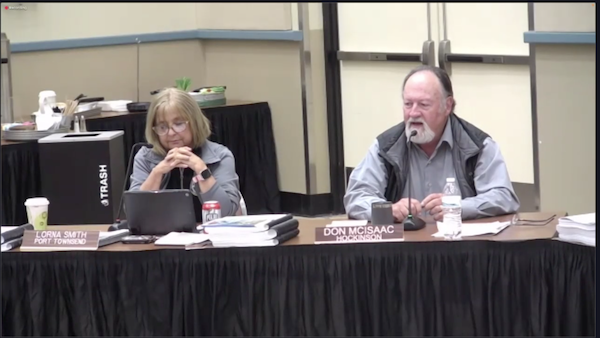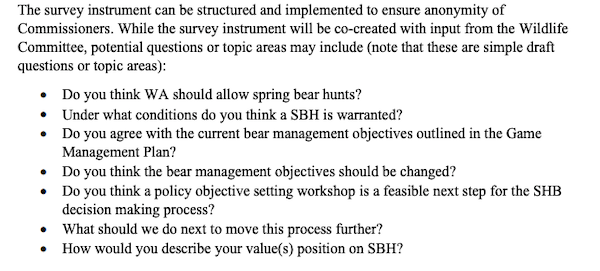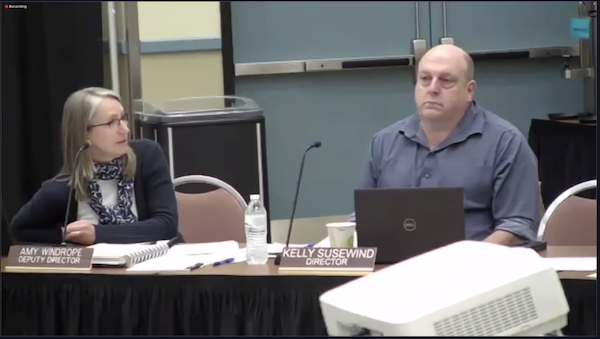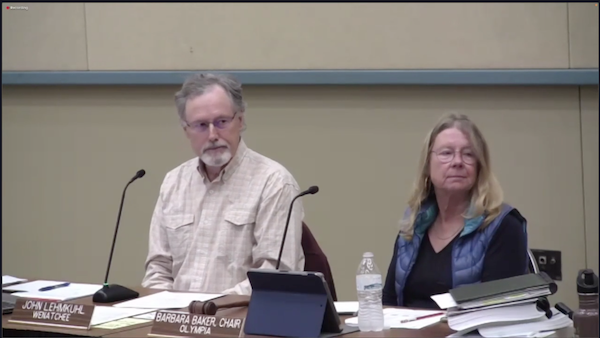
WDFW Commission To Set Spring Bear Hunt Policy By Year End
Washington’s Fish and Wildlife Commission has decided that by the end of this year it will set a policy around the spring black bear season, a limited-entry hunt that is socially controversial among some but biologically sound.
At meetings late last week in Ocean Shores, the citizen panel decided to go ahead and develop a survey for the nine members, with the idea being that the results would “inform policy direction” that will then be talked about at the commission’s October 27-29 get-together in Colville before a final decision is made.

The approach came out of Thursday’s Wildlife Committee meeting and the survey of members will be coauthored by WDFW’s new conservation social scientist, David Trimbach, with input from Commission Chair Barbara Baker of Olympia and Commissioner Kim Thorburn of Spokane, who represent opposite sides of the issue.
Members have a deadline of September 30 for submitting questions to the trio for potential inclusion in the survey. Trimbach, Baker and Thorburn will also develop an outline for a possible commission workshop by October 14.
A final spring bear policy could be anything from following the state agency’s legislative mandate to provide sustainable hunting opportunities, to not doing so.

As a refresher about how we got to this point, Washington’s spring bear hunt, with its 600-some permits in recent years for select game management units scattered around the state, 1) came under fire in December 2020 when the 2021 season was approved by the commission 8-1. Challenged (2) in court, just before that hunt was set to begin a 3) Thurston County Superior Court judge denied two sisters’ bid to cancel it.
But 4) two new commission appointees from the Governor’s Office at the start of last year and 5) concerted opposition during public comment last October always meant 2022’s hunt had a narrower chance of approval, and 6) in November a 4-4 vote paused it.
Afterwards 7) hunting organizations and hunters petitioned to reinstate it and 8) in a 4-3 decision this January, the commission reinitiated rulemaking for an abbreviated 2022 season. That was 9) immediately followed by Olympia’s addition of three more new commissioners and 10) another vote, this time scuttling the 2022 hunt for good. Then in July and by the same 5-4 margin, 11) the commission directed WDFW staff not to bother drumming up a 2023 hunt proposal.

But in the background has been the panel’s promise to develop a policy around the spring bear hunt, and so WDFW staffers have been working on a framework to help them reach that decision.
Fast forward to last Thursday, led by Wildlife Committee Chair Thorburn, the six commissioners in attendance talked their way toward the aforementioned survey, maybe a workshop, and for sure an end-of-the-year decision.
WDFW’s Trimbach had outlined a six-month plan for reaching a policy, but commissioners wanted a much more compressed timeline, given the fact that the terms of three members – Baker, Thorburn and Don McIsaac of rural Clark County – are up at the end of 2022.
“As a new commissioner this year, I didn’t appreciate being thrust into the vortex of the spring bear hunting issue,” stated John Lehmkuhl of Wenatchee. “It’s like chaos and you’re thrown right in the middle of it. I don’t think we want to put any new commissioner in that.”
Once again, his will be the key vote because, honestly, I don’t see any of the other eight members budging off their previous votes, which, strictly speaking, were about setting one season’s permit levels, dates and other minor tweaks, but in reality about so much more.
And neither does Lehmkhul.
“It seems to me that the positions on the issue are pretty polarized. So I mean, there’s four commissioners that would probably vote for and probably four commissioners that would probably vote against. And then there’s one commissioner out there somewhere,” Lehmkuhl said.
That was a reference, respectively, to Thorburn, McIsaac, Jim Anderson and Vice Chair Molly Linville; Baker, Lorna Smith, Tim Ragen and Melanie Rowland; and himself.

Interested in the idea of a different approach to the topic, his initial idea was to come up with a shortcut around the survey to get to the commission workshop faster – essentially, the blocs of four would caucus together to come up with proposals about a spring bear policy and then the nine would vote.
That wasn’t adopted and neither was an anonymous survey, but ultimately the exercise appears to have set up a process for reaching a decision before New Year’s Eve.
“We, staff, are waiting for guidance on what you want us to do with spring bear, and we can’t move forward until we hear how to move forward,” stated Amy Windrope, WDFW deputy director, “so we need to know, Is this a way forward for us?”
University of Washington Coop Unit staff will also be involved in the process.
Held as far back as 1973, Washington’s spring bear hunt has been couched as a limited early-season big game opportunity, a means to reduce timber damage caused by hungry bears, an effort to increase fawn and elk calf survival, and to minimize the odds of bruin-human conflict.
Opponents don’t like it, claiming more information is needed about bruin numbers and they call the hunt unethical and cruel, but there are no conservation concerns around Washington black bears and expected harvest at recent permit levels was estimated at 145 bears, a fraction of a fraction of the statewide population.
In other Fish and Wildlife Commission business last week, members heard about Washington Coast steelhead, opening a portion of the Chelan River for catch-and-release fishing and periodic status reviews of white and brown pelicans, western snowy plovers and Cascade foxes, talked conservation policy, and more.
